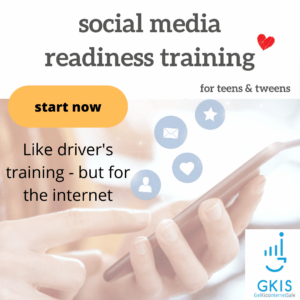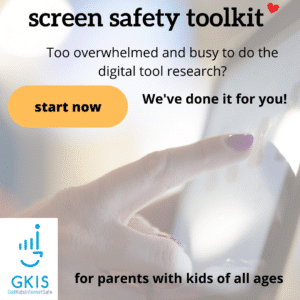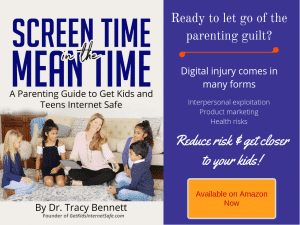
Families can no longer avoid screen media exposure in today’s technology driven society. Research demonstrates that exposure to different types of screen media, including television, computers, smartphones, and tablets, can have positive as well as negative effects on children depending on the age of the child, the quality of content, and the amount of exposure. How can we ensure that our children are exposed to the RIGHT type of media in ways that promote intellectual growth?
The Preoperational Child
Preschool age is between 3 to 5 years. The first 5 years of life are critical ages for learning and brain development. Let’s take a look at the different areas preschool-aged children learn and how their educational outcomes can be optimized through appropriate media use:
A Growing Brain & Motor Development
- Ninety percent of a child’s brain development occurs between birth and 5 years of age (Frist, 2013). This makes it a pivotal time to expose children to a variety of educational information to expand their growing minds to their fullest potential.
GKIS Quick Tip: Choose media that introduces a wide variety of concepts to build upon for future learning. Areas can include language, math, functional skills, motor skills, creativity, and more. But make sure these concepts are delivered in small, deliberate doses. Avoid overwhelm by limiting screen time, delivering age-appropriate content, and avoiding frenetic, rapidly paced videos. Ensure appropriate engagement by co-viewing with your child and talking them through new concepts to facilitate learning and deepen your parent-child learning alliance.
- As children progress through the preoperational stage, they learn to master gross motor skills, like running, jumping, and climbing, through exercise and play (Hanley, 2016).
GKIS Quick Tip: Interactive games that require active participation through physical activity rather than passive viewing can help improve motor, spatial, and coordination skills, particularly when outside play is not possible. For example, many Wii games encourage active participation through movement detection and feedback. Again, co-engagement is a win-win!
- Children also learn to master fine motor skills (working with their fingers and hands) through active practice (Hanley, 2016).
GKIS Quick Tip: Tablets for children provide age-appropriate games and apps that enable children fine motor skill practice, like playing the piano, drawing shapes, as well as writing letters and words. For example, the Color and Draw for Kids app works as a virtual coloring book that helps children learn colors as well as fine-tune fine motor skills that are practiced through drawing.
Concrete & Abstract Thinking
- According to Jean Piaget’s stages of cognitive development, children between the ages of 2 to 7 years old are undergoing the preoperational stage of development. This means kids are learning to form stable concepts but still have magic beliefs and have trouble taking the perspectives of others. With play and practice, they are constantly adding to their mental repertoire, such as major language development. In fact, children who do not develop necessary language skills by the age of 5 years are 6 times more likely to experience difficulty with reading in school (Frist, 2013).
GKIS Quick Tip: Media can benefit young children by teaching literacy and numerical skills. A recent study has shown that growth produced from watching the show Sesame Street is equally comparable to learning in a preschool classroom (Tankersley, 2015). Children exposed to the show were more likely to keep up academically at the appropriate grade level for their age. Interestingly, this effect was particularly pronounced among boys and children who grow up in disadvantaged neighborhoods. Reading skills can also be enhanced through computer games such as Teach Your Monster to Read. That means balanced use digital literacy using appropriate content can be intellectually beneficial by preschool age!
- Thoughts are primarily generated by concrete rather than abstract ideas in early preschool years. In other words, young children learn about the world around them in a physical manner rather than through representations in their own thoughts.
GKIS Quick Tip: Choose games that allow your preschooler to be an active, rather than a passive, learner. For example, the game Sago Mini Toolbox lets players work virtually with tools, including saws and power drills, to complete building projects. These types of games teach children to work directly toward accomplishing a goal without too much emphasis on the depth of thinking that abstract ideas require. More information about this game can be found at the Common Sense Media website which provides ratings of educational media that will benefit your preschool child.
- Although preschool children learn primarily through manipulating their environment, towards the end of this period they begin to use symbolic thinking, which means they use internal images to represent objects or people. This is evident through imaginary play. Preschool children often adopt roles such as doctor, mother, father, or cook so that they can practice using social norms and gender roles they see performed in their everyday lives. A child will also use inanimate objects as symbols for other objects (Cherry, 2016). For example, a child may use a blanket to represent a cape, therefore making him/her a real-life superhero.
GKIS Quick Tip: Because imaginative play is developing in the preschool years, exposing children to apps and computer games that emphasize pretend thinking may enhance intellectual abilities as well as creativity. Dr. Panda School is a highly rated game from the website Fundamentally Children’s “Good App Guide.” This app enables players to adopt and explore different roles in an educational context by telling stories about their experiences from the perspective of a teacher, nurse, cook, or even a janitor.
Making and Keeping Friends
- According to Erikson’s psychosocial stages of development, preschoolers begin to practice interpersonal skills in classroom settings. They do this through participating in pretend play with others and initiating activities with others.
GKIS Quick Tip: Media can benefit preschool children by teaching social skills (Burton, 2015). Videos, television shows, and computer games can teach cooperation and sharing. An example of a beneficial program includes Toca Tea Party This program teaches social skills by allowing children to practice hosting their very own tea party with parents or friends.
- Children at this age become increasingly curious and inquisitive. They begin to assert themselves more and ask questions to learn more about the world around them (McLeod, 2013).
GKIS Quick Tip: Try using screen activities that prompt questions that require parental input or knowledge. For example, the app Knoala requires children and parents to collaborate in a variety of activities including dancing, singing, crafts, treasure hunts, and more. These types of games not only promote learning, but also strengthen the attachment between you and your child.
- Children in later preschool years begin to develop theory of mind, which means they gain the ability to understand the feelings and thoughts of others rather than just their own (Cherry, 2016). This particular change in mentality strengthens relationships with peers as well as adults.
GKIS Quick Tip: Computer games can provide children with the practice they need to interact with others appropriately. The game Social Express allows children to interact in simulated situations that mimic social interactions in real-life. It involves decision-making on the part of the player. Each social decision made will have a positive or negative response (Higgin, 2014). Through these experiences in a virtual world, preschool children are able to learn social cues, norms, and skills that they can apply in different settings as well as identify how their actions affect others.
Early exposure to educational media during the preschool years may contribute to intellectual growth. However, preschool children using too much screen media is associated with lower cognitive development and academic achievement (Kirkorian, Wartella, & Anderson, 2008). That means short time periods and age appropriate educational content is key for screen media benefit. Furthermore, accessibility to loving, responsive caregivers is necessary to enrich screen learning and teach important interpersonal skills such as empathy and emotional soothing. There is simply no replacement for love and one-to-one attention.

I’m the mom psychologist who will help you GetYourKidsInternetSafe.
Onward to More Awesome Parenting,
Tracy S. Bennett, Ph.D.
Mom, Clinical Psychologist, CSUCI Adjunct Faculty
GetKidsInternetSafe.com
Works Cited
Burton, L. (2015, June). Media benefits for children and teenagers. Retrieved from http://raisingchildren.net.au/articles/media_benefits.html
Cherry, K. (2016). What Is the Preoperational Stage of Cognitive Development? Retrieved from https://www.verywell.com/preoperational-stage-of-cognitive-development-2795461
Frist, B. (2013). Child’s first 5 years hold key to success. Retrieved from http://toosmall.org/news/commentaries/childs-first-5-years-hold-key-to-success
Hanley, S. (2016). Major Milestones in the Biological Development of Children. Retrieved from http://oureverydaylife.com/major-milestones-biological-development-children-1883.html
Higgin, T. (2014). Inventive Games That Teach Kids About Empathy and Social Skills. Retrieved from https://ww2.kqed.org/mindshift/2014/04/18/inventive-games-that-teach-kids-about-empathy-and-social-skills/
Kirkorian, H. L., Wartella, E. A., & Anderson, D. R. (2008). Media and Young Children’s Learning. Retrieved from http://www.futureofchildren.org/publications/journals/
McLeod, S. A. (2013). Erik Erikson. Retrieved from www.simplypsychology.org/Erik-Erikson.html
Tankersley, J. (2015). Study: Kids can learn as much from ‘Sesame Street’ as from preschool. Retrieved from https://www.washingtonpost.com/business/economy/sesame-street-and-its-surprisingly-powerful-effects-on-how-children-learn/2015/06/07/59c73fe4-095c-11e5-9e39-0db921c47b93_story.html
Photo Credit
9/365 game day by Jack Fussell, BY CC 2.0
On the Edge by Miika Silfverberg, BY CC 2.0
Student With Ipad At School – 143 by Brad Flickinger, BY CC 2.0
Don't worry, we will never spam you.









